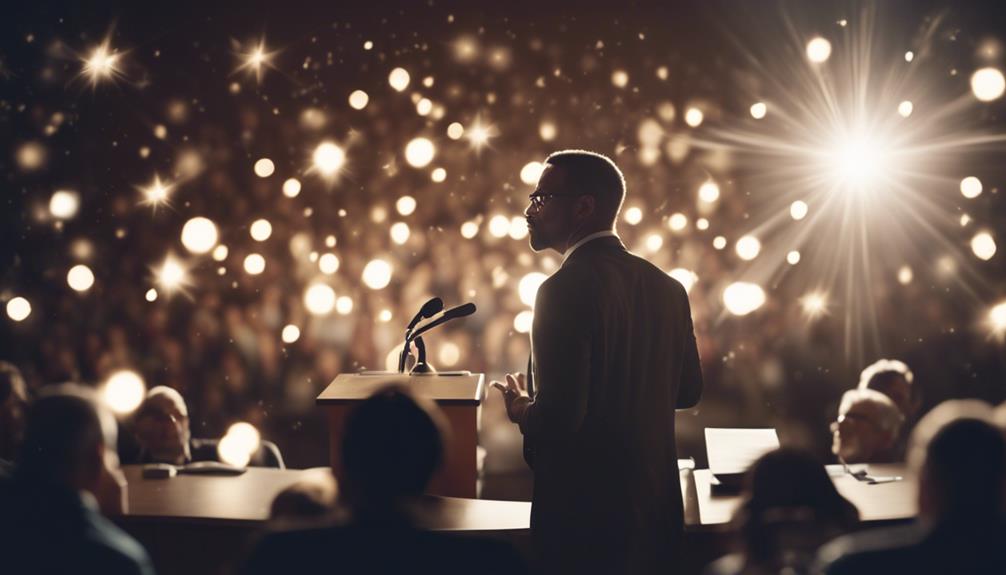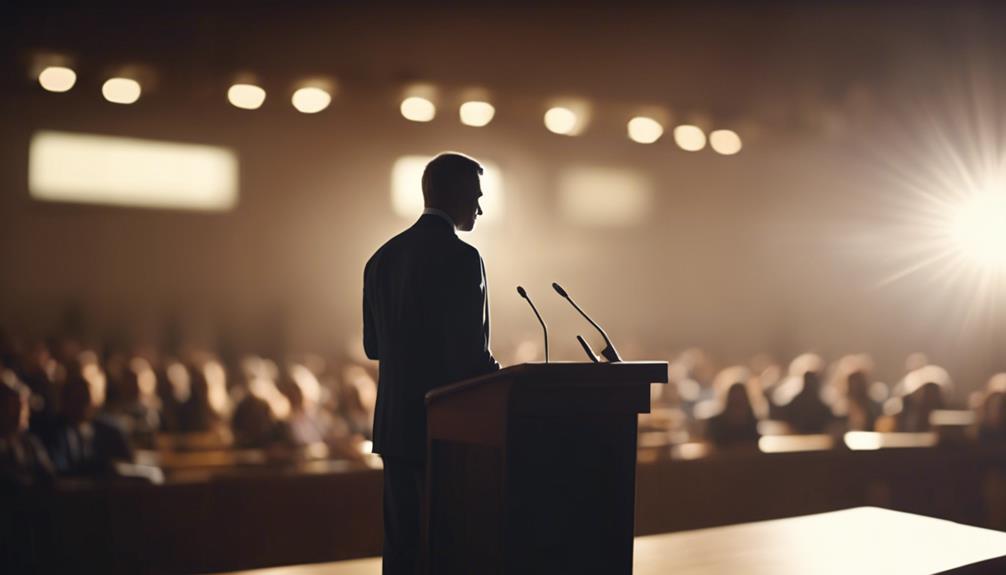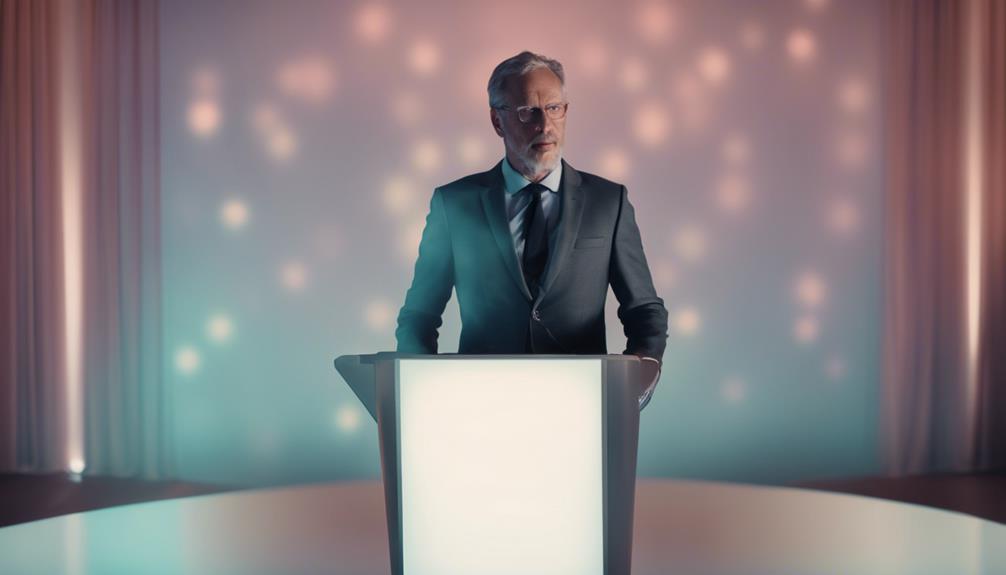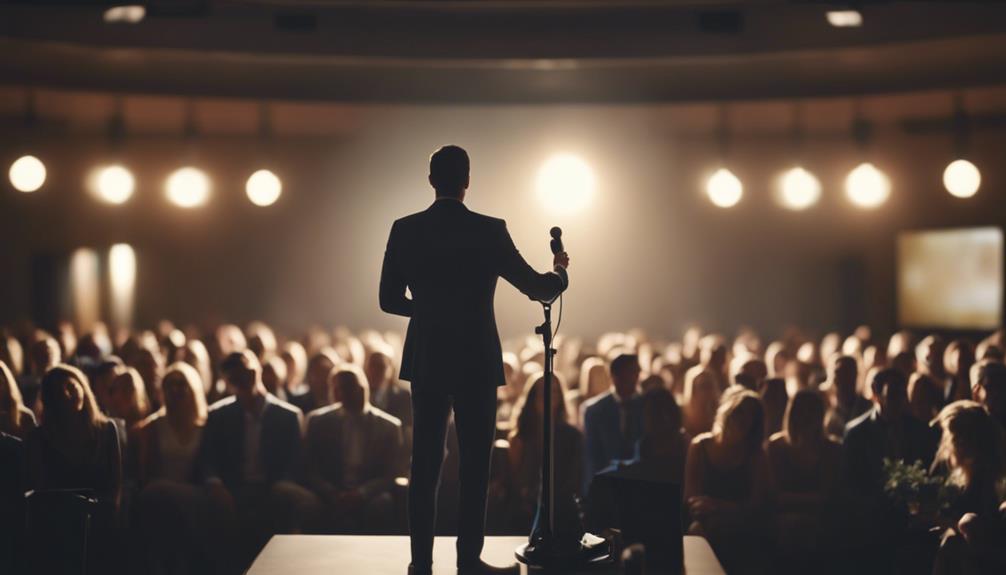When you attend a conference or corporate event, you've probably noticed that one speaker stands out from the rest, setting the tone and direction for the entire event with their inspiring and informative speech – that's the keynote speaker. They're the central figure, relying on their expertise to craft a compelling narrative that inspires, educates, and entertains the audience. A good keynote speaker has an engaging stage presence, connects emotionally, and delivers well-paced speeches that leave a lasting impact. Want to know more about what makes a keynote speaker great and how they craft their impressive speeches?
Key Takeaways
- A keynote speaker is the central figure of an event, setting the tone and direction with their expertise and compelling narrative.
- They craft inspiring, educating, and resonating speeches that captivate and motivate audiences, leaving a lasting impact.
- Keynote speakers possess engaging stage presence, commanding communication skills, and the ability to connect emotionally with diverse audiences.
- They are experts in their field, delivering valuable insights and unique perspectives that enrich the event's theme and goals.
- A keynote speaker's role is to inspire, educate, and entertain, making them a crucial element in the success of an event or conference.
Defining the Keynote Speaker Role
As the central figure of an event, a keynote speaker is tasked with setting the tone and direction of the entire experience, relying on their expertise to craft a compelling narrative that resonates with the audience.
You're probably wondering, what's the big deal about a keynote speaker? Well, they're the primary speaker at an event, responsible for setting the central theme and tone. They're experts in their field, and their speeches are designed to inspire, entertain, and educate.
As a keynote speaker, their role is to engage attendees, providing unique perspectives that leave a lasting impression. They captivate the audience with their dynamic speaking skills, blending motivation, inspiration, and education seamlessly. By setting the tone, they create an atmosphere that resonates with the audience, making the event a memorable one.
Qualities of a Good Keynote Speaker

As you explore the world of keynote speakers, you're probably wondering what makes a good one tick. You want someone who can captivate the audience with their stage presence and communicate their ideas with confidence.
That's where engaging stage presence and commanding communication skills come in – the essential qualities that set a great keynote speaker apart from the rest.
Engaging Stage Presence
You need a dynamic stage presence to truly captivate your audience, and a good keynote speaker knows how to harness this power to keep attendees engaged from start to finish.
A good keynote speaker's engaging stage presence is what sets them apart from others. They've mastered the art of connecting with the audience on an emotional level, making their message more relatable and memorable. With a dynamic delivery style, they keep you focused and interested, using well-paced speaking, effective body language, and vocal variety to convey their message.
By doing so, they inspire and motivate you, leaving a lasting impact long after the presentation is over. A good keynote speaker's stage presence is infectious, making you want to lean in and listen more. They make you feel like you're part of something special, something that will stay with you long after the event is over.
With an engaging stage presence, a good keynote speaker can move mountains, or at least, move you to take action.
Commanding Communication Skills
A good keynote speaker's commanding communication skills empower them to craft and deliver dynamic, well-paced speeches that captivate and educate audiences of varying expertise levels.
You'll find that expert speakers possess deep knowledge in their field, which enables them to deliver valuable insights that resonate with their audience. Their exceptional communication skills allow them to engage audiences, convey important messages, and leave a lasting impact.
As a result, keynote speakers wield significant influence, inspiring and educating their listeners. You might wonder what sets them apart from other speakers. The answer lies in their ability to connect with audiences of varying expertise levels, drawing on their extensive public speaking experience.
Finding the Right Keynote Speaker

Your quest for the perfect keynote speaker begins with a strategic networking effort, tapping into networks, educational institutions, and industry experts for valuable recommendations. You can also reach out to charities, foundations, and related organizations to identify potential keynote speakers. Don't forget to utilize databases like the National Speakers Bureau or platforms like Speaker Match to connect with industry experts.
When searching for the right keynote speaker, factor in elements like expertise, relevance to the event theme, and ability to engage and inspire attendees. A good keynote speaker can enhance the event experience by offering a unique perspective and insights to the audience.
Here's a breakdown of what aspects to take into account when finding the right keynote speaker:
| Factor | Description | Importance Level |
|---|---|---|
| Event Theme | Relevance to the event's theme and purpose | High |
| Expertise | Industry expertise and credibility | High |
| Engagement | Ability to engage and inspire attendees | Medium |
| Uniqueness | Offers a unique perspective or insight | Medium |
What Makes a Great Keynote Speech

While identifying the right keynote speaker is a significant step, it's equally important to understand what makes a great keynote speech, which can elevate the entire event experience.
As you're finding the right keynote speaker for your event, you're probably wondering what exactly makes their speech so impactful. A great keynote speech does more than just deliver information – it inspires, educates, and resonates with the audience.
A good keynote speech draws on a wide knowledge base, shares personal experiences, and showcases expertise, making the topic relatable and engaging. The role of a keynote speaker is to captivate and motivate listeners, leaving a lasting impact long after the event is over.
By balancing experiences with the event context, a great keynote speech provides valuable insights, new understanding, and a fresh perspective on the topic.
Introducing a Keynote Speaker

When introducing a keynote speaker, you're setting the stage for their entire presentation. You want to make an impact, get the audience excited, and create a buzz around the speaker's message.
Setting the Tone
As you prepare to introduce the keynote speaker, keep in mind that a well-crafted introduction can make all the difference in setting the tone for a memorable and engaging presentation.
You want to create an atmosphere that's exciting, where the audience is on the edge of their seats, eagerly anticipating what's to come. That's where a concise and impactful introduction comes in.
By highlighting the keynote speaker's credentials and expertise, you'll build anticipation and generate enthusiasm among the audience. This is your chance to give them a sneak peek into what's about to unfold, showcasing the speaker's unique perspective and what makes them an authority in their field.
A well-executed introduction sets the stage for a stimulating presentation, and it's up to you to create that spark. So, take a deep breath, and let your introduction shine!
Making an Impact
With the tone set, you're now ready to make a lasting impact by introducing the keynote speaker in a way that electrifies the audience and sets the stage for a memorable presentation.
You want to craft an introduction that not only establishes credibility but also builds anticipation and sets a positive atmosphere. To do this, you'll need to highlight the keynote speaker's credentials, expertise, and achievements in a concise and engaging way.
By doing so, you'll create an enthusiastic ovation, get the audience excited, and guarantee a smooth shift to the keynote speaker's address. An effective introduction won't only boost the speaker's confidence but also engage the audience from the start.
Types of Keynote Speaking Engagements

From industry summits to academic symposiums, you'll find keynote speakers delivering impactful addresses at a wide range of events. As a keynote speaker, you'll be invited to share your expertise at conferences, corporate events, and more. These speaking engagements can be anything from a single presentation to a multi-day conference, where you'll address diverse audiences on relevant topics.
Sometimes, you'll be the opening or closing act, setting the tone for the entire event. Other times, you'll be part of a specific session, providing valuable insights to attendees. You might even participate in virtual events, webinars, or online conferences, adapting your presentation to engage remote audiences effectively.
The goal is to inspire, educate, and motivate attendees, leaving a lasting impact and enhancing the overall event experience. Whether in-person or online, your keynote addresses have the power to make a real difference. By sharing your knowledge and expertise, you'll create a memorable experience that attendees will cherish long after the event is over.
Choosing Between Keynote and Guest

You're likely to face a decision when preparing for an event: should you take on the role of a keynote speaker or a guest speaker? This choice can have a significant impact on the event's success.
As a keynote speaker, you'll set the central theme of the event, delivering a speech that balances motivation, inspiration, and industry-specific insights. You'll be responsible for setting the stage and providing a broad understanding of the topic.
On the other hand, as a guest speaker, you'll focus on specific subtopics, adding depth and diversity to the content. Your role is to enrich the discussion, providing unique perspectives and variety to the event.
Both roles are essential to event success, but they require different approaches. Consider your strengths and goals: do you want to establish the overall tone or provide a fresh perspective? Choose wisely, and you'll be well on your way to making your event a memorable one.
Maximizing Keynote Speaker Impact

To maximize your impact as a keynote speaker, align your expertise with the event's goals and deliver a speech that resonates with the audience, leaving a lasting impression long after the event is over.
You want your message to stick, right? To do so, prepare thoroughly by researching the audience, rehearsing your speech, and incorporating feedback. This will help you craft a relevant and engaging speech that resonates with the crowd.
Don't forget to incorporate storytelling and audience interaction to keep them hooked! After the event, engage with attendees on social media, host workshops, or post-event activities to prolong your impact.
As a keynote speaker, your goal is to provide value that extends beyond the event itself. By doing so, you'll establish yourself as a thought leader in your industry, and your speeches will be remembered for years to come.
Frequently Asked Questions
What Is the Role of a Keynote Speaker?
As you step onto the stage, you'll discover your role as a keynote speaker is to captivate the audience, set the tone, and inspire with your expertise, ultimately driving the event's energy and success.
What Is the Difference Between Speaker and Keynote Speaker?
As you step into the spotlight, you wonder what sets you apart from others. The difference between being a speaker and a keynote speaker lies in impact: one adds flavor, while the other sets the tone, steering the event's narrative like a master conductor leading an orchestra.
Why Is It Called Keynote Speaker?
You're wondering why it's called a keynote speaker? It's because the term originated from music, where the keynote sets the tone, and similarly, the keynote speaker sets the central theme or message for the entire event.
Can Anyone Be a Keynote Speaker?
Can you become a keynote speaker? Absolutely! With dedication and expertise, you can develop the skills and credibility needed to stand out in your field and inspire audiences as a keynote speaker.
What Qualities Make a Good Keynote Speaker?
A good keynote speaker meaning inspiration audience has several key qualities. They need to be charismatic and engaging, able to capture the audience’s attention from the start. They should also be knowledgeable and passionate about their topic, and able to deliver their message with clarity and confidence.
Conclusion
As you've navigated the world of keynote speakers, imagine yourself standing at the summit of a mountain, with the entire landscape of possibilities unfolding before you.
You've got the map, the compass, and the skills to chart your own course. Now, it's time to commence on your own keynote adventure, armed with the knowledge to find, appreciate, and maximize the impact of these inspiring orators.
The stage is set, the spotlight is on – go make your mark!










